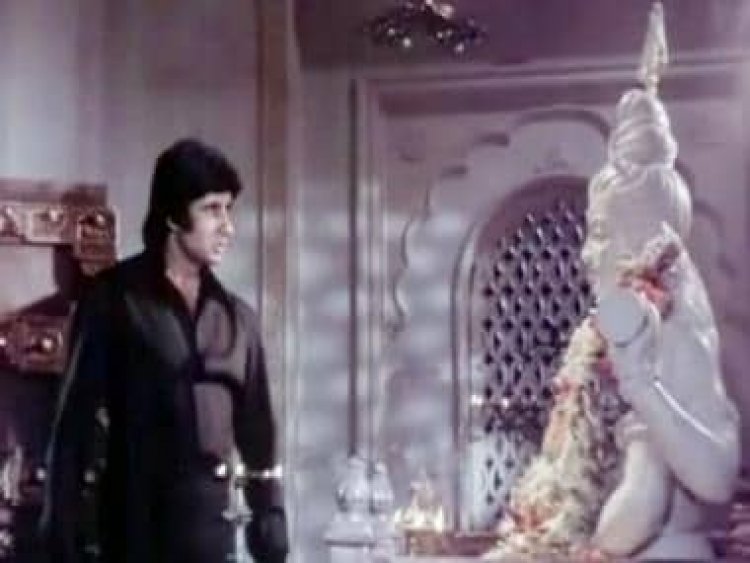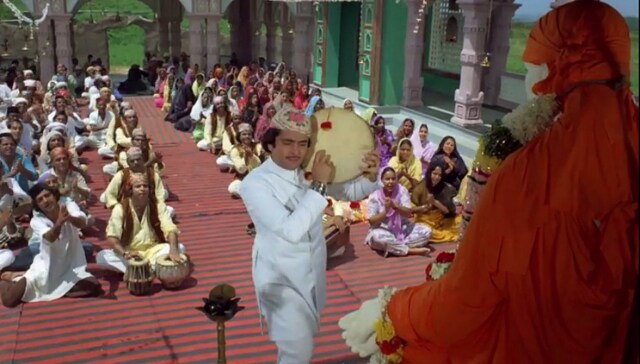Retake: Angst, anguish and conversations around faith
Retake: Angst, anguish and conversations around faith

In one of the most iconic scenes from Hindi cinema’s history, a blind Nirupa Roy, ambles her way to a mosque-like structure where a muslim man (Rishi Kapoor as Akbar) is singing the prayers of Shirdi’s Sai Baba. “Raatein ye kaali, inko bnaa de tu Eid aur Diwali”, he sings. Moments later, two candle flames travel via some camera trickery, from the idol’s eyes into Roy’s. She can see again! Manmohan Desai’s film is possibly as ‘Bollywood’ as Hindi cinema ever got. Loud, ludicrously overblown but ecstatically mesmerising in both reason and effect, Amar Akbar Anthony is one of those rare specimens that continue to flutter with the same irrepressible energy that it possessed decades ago. This particular scene, however, illustrates a socio-political construct inextricably linked to our ideas around faith, and its utility to us.

In a scene from Deewar, Vijay, played by Amitabh Bachchan returns to the temple his mother has been praying at for years. “Aaj khush toh bohat honge tum,” he says while addressing a lifeless idol that to a majority of the country also represents a divine, untouchable higher power. It’s an intense sequence, an angry soliloquy masquerading as a conversation with the higher, elusive power. It’s also emblematic of the helplessness most Indians feel at the sight of a moral crisis. As a young country, the idea of life and death, health and wealth, were all still tied to the unattainable elements of providence and luck. You couldn’t simply as is prophesied today, ‘build yourself up’. Luck had a lot to do with it. It’s a story we have possibly learned to tell ourselves to account for that which we couldn’t have – money, privilege, freedom and space.
The idea of religion in this country is sacrosanct but our cinema has in the past bravely gone where no art form has. It has turned lifeless idols into conversational pivots. In Sholay, for example, Basanti played by the unforgettable Hema Malini talks to a goddess, echoing a certain divinity herself. Faith here isn’t something you turn to for mercy, but also something you ask modest, unthreatening questions of. While Vijay is desperate, Basanti is simply speaking where she can possibly speak freely. Here faith is the warm embrace of empathy. In Gopi Kishan conversations inside religious places are far more casual, representing a place where families converge and congregate for a sense of unity. In a number of Karan Johar’s films from the late 90s, most moneyed Indians turn to faith to establish their ‘Indianness’. Pooh, in Kabhi Khushi Kabhie Gham, for example, becomes a sort of Parvati with a swift sweep of the aarti.
From the utterly magically, to the earthly and wearable, our interactions with faith in cinema represent in one form or the other, a mirror for self-identification. It’s probably a form of agency that exists by default in a vacuum where everything else is either hidden or stymied. In the films of 70s, for example, faith echoes divine intervention, overarching the evil of human intent. In the 90s, it becomes the rescue for a generation seemingly becoming unhinged under foreign influence. More than simply apply the tools of asceticism, however, Hindi cinema has also chosen to query faith more than just submitting to its magical qualities.
Faith is naturally a loaded subject in the Indian context, impossible to separate from politics and identity, but in cinema, it has been showcased as a fluid centre of focus for our deepest anxieties. From desperately praying for miracles that actually happen to questioning the purpose of devotion in the first place, Hindi cinema has stretched the air around faith into a fluid conversation that can both confound, mislead and at times, literally enlighten. It also, arguably, represents a stasis in the country’s mentality. We don’t demand answers from people as ferociously as we do from those we pray to. Even faith, our cinema says, is built on unsaid trust. The moment the other side speaks it perishes. We are all, in a sense, desperate to be heard.
Desai’s legendary sequence of returning the eyesight of Roy is possibly as symbolic as Bollywood is old and ostentatious about even its subtlest of messages. The immediacy, the catharsis is all woven into the language of our cinema, in a way that makes it impossible to not dissolve into the limitlessness of the imagination. Our faith, irrespective or religion, codes for us our boundaries, our invisible cloaks of culture and mannerisms. We swear by our breath, but live by the idea that each of those breaths is watched over, accounted for, guided by a higher power. The fact that a victim in Amar Akbar Anthony is graciously rewarded in somewhat the same manner as Vijay is heard in Deewar, illustrates just how diversely we interpreted faith as both a medium and a destination.
Manik Sharma writes on art and culture, cinema, books, and everything in between.
Read all the Latest News, Trending News, Cricket News, Bollywood News, India News and Entertainment News here. Follow us on Facebook, Twitter and Instagram.
What's Your Reaction?



























































